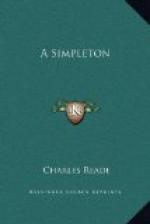Well, he did not interfere; on the contrary, he was careful to avoid putting his daughter on her guard: he said to himself, “Lord Tadcaster does her good. I’m afraid she would not marry him, if he was to ask her now; but in time she might. She likes him a great deal better than any one else.”
As for Philip, he was abroad for his own health, somewhat impaired by his long and faithful attendance on Rosa.
So now Lord Tadcaster was in constant attendance on Rosa. She was languid, but gentle and kind; and, as mourners, like invalids, are apt to be egotistical, she saw nothing but that he was a comfort to her in her affliction.
While matters were so, the Earl of Miltshire, who had long been sinking, died, and Tadcaster succeeded to his honors and estates.
Rosa heard of it, and, thinking it was a great bereavement, wrote him one of those exquisite letters of condolence a lady alone can write. He took it to Lady Cicely, and showed it her. She highly approved it.
He said, “The only thing—it makes me ashamed, I do not feel my poor father’s death more; but you know it has been so long expected.” Then he was silent a long time; and then he asked her if such a woman as that would not make him happy, if he could win her.
It was on her ladyship’s tongue to say, “She did not make her first happy;” but she forbore, and said coldly, that was maw than she could say.
Tadcaster seemed disappointed by that, and by and by Cicely took herself to task. She asked herself what were Tadcaster’s chances in the lottery of wives. The heavy army of scheming mothers, and the light cavalry of artful daughters, rose before her cousinly and disinterested eyes, and she asked herself what chance poor little Tadcaster would have of catching a true love, with a hundred female artists manoeuvring, wheeling, ambuscading, and charging upon his wealth and titles. She returned to the subject of her own accord, and told him she saw but one objection to such a match: the lady had a son by a man of rare merit and misfortune. Could he, at his age, undertake to be a father to that son? “Othahwise,” said Lady Cicely, “mark my words, you will quall over that poor child; and you will have two to quall with, because I shall be on her side.”
Tadcaster declared to her that child should be quite the opposite of a bone of contention. “I have thought of that,” said he, “and I mean to be so kind to that boy, I shall make her love me for that.”
On these terms Lady Cicely gave her consent.
Then he asked her should he write, or ask her in person.
Lady Cicely reflected. “If you write, I think she will say no.”
“But if I go?”
“Then, it will depend on how you do it. Rosa Staines is a true mourner. Whatever you may think, I don’t believe the idea of a second union has ever entered her head. But then she is very unselfish: and she likes you better than any one else, I dare say. I don’t think your title or your money will weigh with her now. But, if you show her your happiness depends on it, she may, perhaps, cwy and sob at the very idea of it, and then, after all, say, ’Well, why not—if I can make the poor soul happy?’”




